Keeping an aquarium healthy needs regular care. But, even beginners can do it right. This guide covers key steps for both freshwater and saltwater tanks. It offers tips to keep your aquarium lively and beautiful. Guide to Aquarium
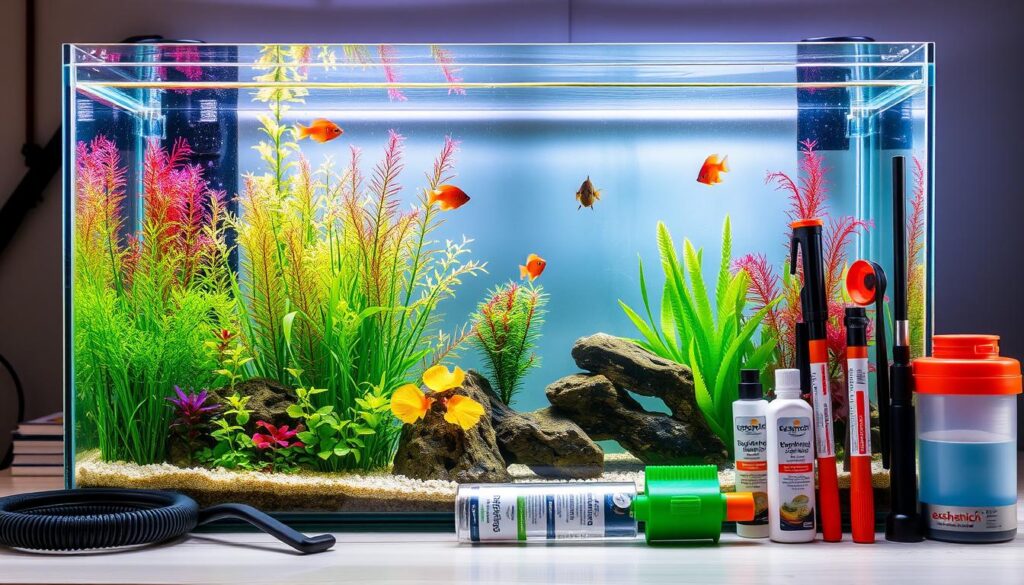
Key Takeaways
- Regular maintenance and cleaning are crucial for your fish and plants’ health.
- Know the tools and supplies you need to care for your aquarium well.
- Learn to check and keep water quality right with regular tests and changes.
- Find out the daily, weekly, and monthly tasks to keep your aquarium perfect.
- Learn the best ways to clean filters and change water for the best aquarium health.
Essential Aquarium Setup and Maintenance Tools
Keeping your aquarium healthy and thriving needs the right tools. From cleaning supplies to water testing kits, the right gear is crucial. Let’s look at the essential tools every aquarium hobbyist should have.
Basic Cleaning Equipment
Cleaning is the base of aquarium care. You’ll need a gravel vacuum, algae scrapers, and soft sponges or cloths. These tools help keep your aquarium setup clean and beautiful.
Water Testing Supplies
Checking water quality is key for your fish’s health. Get a good water testing kit to measure pH, ammonia, nitrites, and nitrates. These water quality testing tools help you make the right water changes.
Maintenance Accessories and Tools
Complete your toolkit with a bucket, siphon, and gravel vacuum. These aquarium maintenance tools make tasks like gravel vacuuming and fish tank decor cleaning easier. Also, don’t forget about aquarium lighting for plant growth and ecosystem health.
With the right tools and equipment, your aquarium will stay healthy and vibrant. This ensures a great home for your aquatic friends.
“Proper aquarium maintenance is the key to a successful and long-lasting underwater ecosystem.”
Understanding Water Quality and Regular Testing
Keeping your aquarium water quality right is key for your fish’s health. Testing the water regularly helps you keep everything balanced. This way, you can fix problems early and keep your aquarium healthy.
For both freshwater and saltwater tanks, watch the pH, ammonia, nitrites, nitrates, and temperature. Changes in these can harm your fish. Testing often and keeping records helps you spot and fix issues quickly.
Importance of Water Changes
Water changes are also crucial for a healthy tank. Waste and toxins build up over time. Changing 25-50% of the water weekly brings in fresh, clean water and removes harmful stuff.
By testing the water and changing it regularly, you’ll have a happy and healthy aquarium. This supports the well-being of your fish and other sea creatures.
| Water Quality Parameter | Ideal Range | Potential Issues |
|---|---|---|
| pH | 6.5 – 8.0 | Fluctuations can stress fish and disrupt biological processes |
| Ammonia | 0 ppm | Toxic to fish, can cause gill and liver damage |
| Nitrites | 0 ppm | Highly toxic to fish, can inhibit oxygen absorption |
| Nitrates | High levels can lead to algae growth and stress fish | |
| Temperature | Varies by species | Significant temperature fluctuations can shock and harm fish |
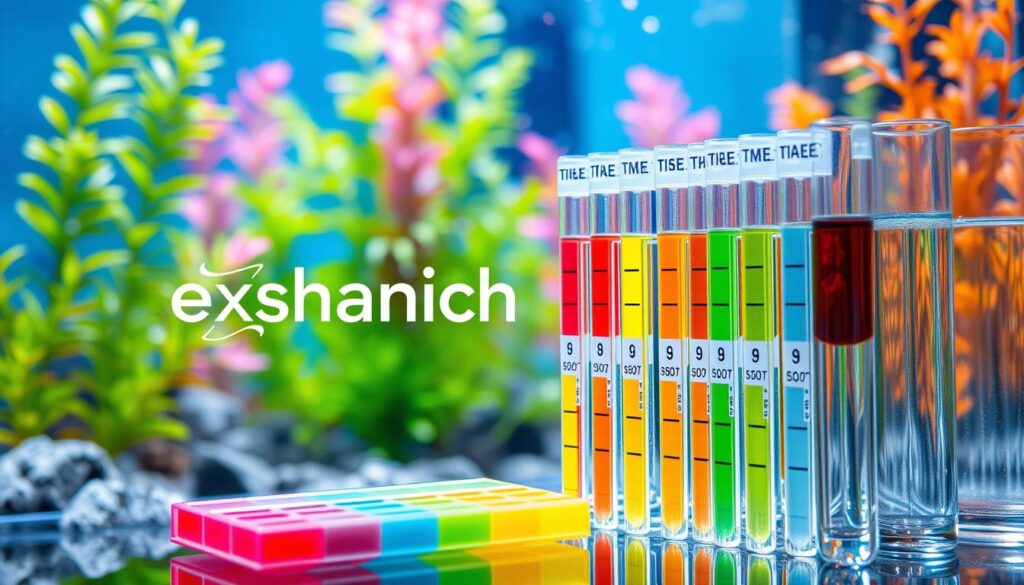
Remember, regular water quality testing and maintenance are essential for the long-term success of your aquarium. By staying on top of these tasks, you can create a thriving and balanced ecosystem that will provide endless hours of enjoyment and satisfaction.
Beginner’s Guide to Aquarium Maintenance and Cleaning
Keeping a fish tank healthy can seem hard for beginners. But, knowing the daily, weekly, and monthly tasks helps a lot. This guide will show you how to keep your tank clean and your fish happy.
Daily Maintenance Tasks
Start each day by watching your fish closely. Look for signs of health like active swimming and right color. Also, feed them the right amount to avoid water problems.
Do a quick tank check for debris or leftover food. Remove any waste to keep the water clear and safe.
Weekly Cleaning Schedule
Weekly tasks keep your tank in great shape. A partial water change is key. It adds fresh water and removes waste. Change 20-25% of the water each week, depending on your tank size.
Use a gravel vacuum to clean the substrate. This removes organic matter and prevents harmful bacteria. Clean the glass walls with a soft scraper or magnetic cleaner for clear views.
Monthly Maintenance Routines
Monthly, do a deeper clean. Change up to 50% of the water to reset the tank’s balance. This also adds important minerals and nutrients.
Clean all equipment thoroughly during this time. Rinse them in the water you remove to keep beneficial bacteria. Make sure hoses and tubes are clean and working right.
By following this guide, your tank will thrive. Remember, sticking to a routine is important. Enjoy watching your aquarium flourish.
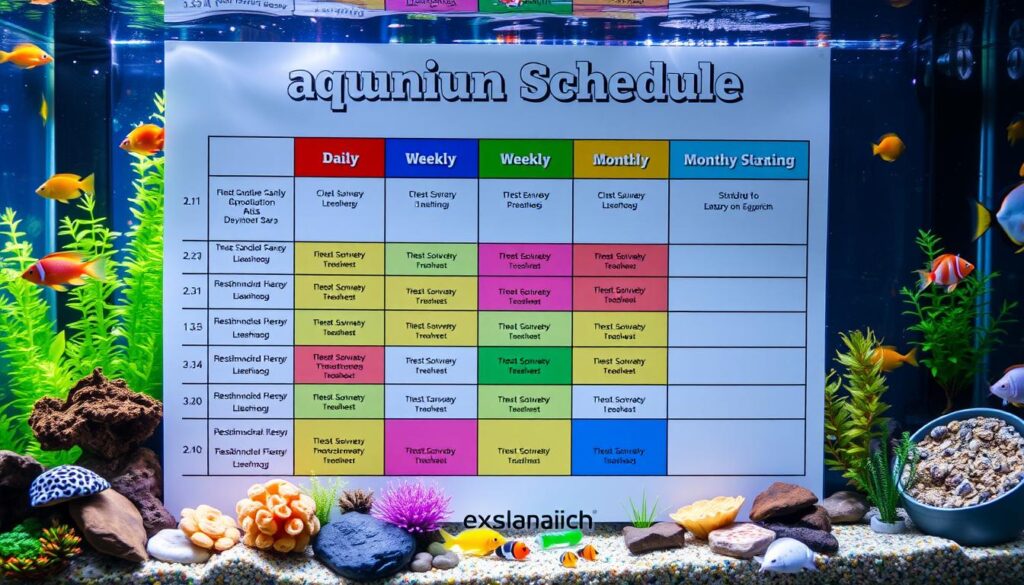
| Maintenance Task | Frequency | Purpose |
|---|---|---|
| Observe fish behavior and feed | Daily | Ensure fish health and prevent overfeeding |
| Partial water change | Weekly | Remove waste, replenish fresh water |
| Gravel vacuum and glass cleaning | Weekly | Maintain water clarity and substrate health |
| Complete water change | Monthly | Reset water parameters and replenish minerals |
| Clean equipment | Monthly | Maintain proper function of filters, heaters, and other devices |
Mastering Filter Maintenance and Water Changes
Keeping your aquarium healthy is all about aquarium filter maintenance and regular water changes. These tasks might seem hard at first, but they’re easy once you know how. With the right steps, your fish tank will stay clean and healthy.
Aquarium Filtration: Keeping it Clean
The filter you pick is key to clean water. No matter the filter, cleaning it often is crucial for aquarium filtration. You might need to rinse media, swap out cartridges, or deep-clean the whole thing.
- Hang-on-back (HOB) filters: Clean the media and impeller monthly to remove debris buildup.
- Canister filters: Disassemble and clean the media every 2-3 months, depending on tank size and bioload.
- Sponge filters: Gently squeeze the sponge in aquarium water during weekly water changes to remove accumulated waste.
Performing Routine Water Changes
Aquarium water changes are vital for water quality and fish health. Change 10-25% of the water weekly. Use a gravel vacuum to get rid of waste and uneaten food. This keeps nitrates low and adds important minerals.
| Tank Size | Recommended Weekly Water Change |
|---|---|
| Under 20 gallons | 10-15% |
| 20-40 gallons | 15-25% |
| Over 40 gallons | 20-25% |
By sticking to these aquarium equipment maintenance tips, your tank will thrive. Remember, regular filter care and water changes are the secrets to a successful aquarium.
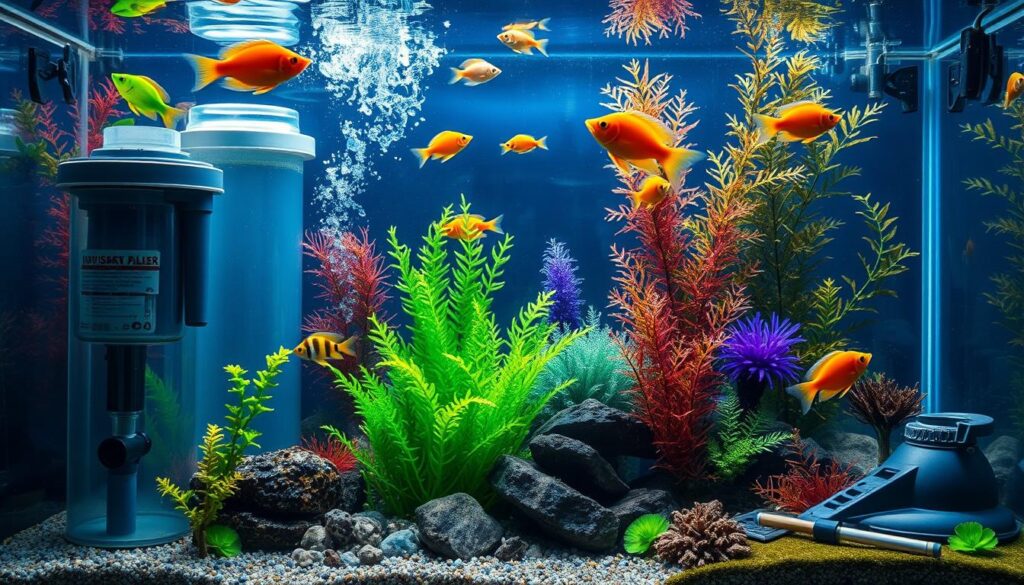
Conclusion
This guide has given you the basics to start your aquarium journey. You now know how to keep your freshwater or saltwater aquarium healthy. You’ve learned about water quality, testing, and how to maintain filters and change water.
Whether you’re new to beginner aquarists or diving into beginner fishkeeping, you’re ready. This guide has given you the tools and techniques for a stunning freshwater aquariums or saltwater aquariums. By following the aquarium care tips, you’re set for a rewarding aquarium experience.
Keeping your aquarium thriving requires dedication and attention to detail. Enjoy watching your fish and other sea creatures grow and thrive. Your aquarium will become a beautiful underwater world in your home. Happy aquarium keeping, and may it bring you joy and wonder.
FAQ
What are the essential tools and equipment needed for aquarium maintenance and cleaning?
You’ll need basic cleaning tools like siphons, algae scrapers, and gravel vacuums. Cleaning brushes are also important. Don’t forget water testing supplies, such as kits for pH, ammonia, nitrites, and nitrates. You’ll also need buckets, sponges, and filter media for maintenance.
Why is it important to regularly test the water quality in my aquarium?
Testing water quality is key to a healthy aquarium. It helps spot any problems early. This way, you can fix them before they cause stress or disease in your fish.
What are the typical daily, weekly, and monthly maintenance tasks for an aquarium?
Daily tasks include feeding fish and checking their behavior. You should also do a quick aquarium check. Weekly, you’ll do partial water changes and clean the glass and decor. Monthly, you’ll do deeper cleaning and filter maintenance.
How do I properly maintain and clean my aquarium’s filtration system?
Keeping your filter clean is vital for water quality. Clean or replace the filter media as needed. Always follow the manufacturer’s instructions to avoid harming the beneficial bacteria.
What is the best way to perform water changes in my aquarium?
Water changes are crucial for your aquarium’s health. Change 10-25% of the water weekly or biweekly. Use a gravel vacuum to remove debris. The exact amount depends on your aquarium’s size and other factors.
How can I effectively control algae growth in my aquarium?
To control algae, maintain good water quality and test it regularly. Ensure the right amount of lighting and add algae-eating fish or invertebrates. Clean the glass, decor, and substrate often to prevent algae buildup.

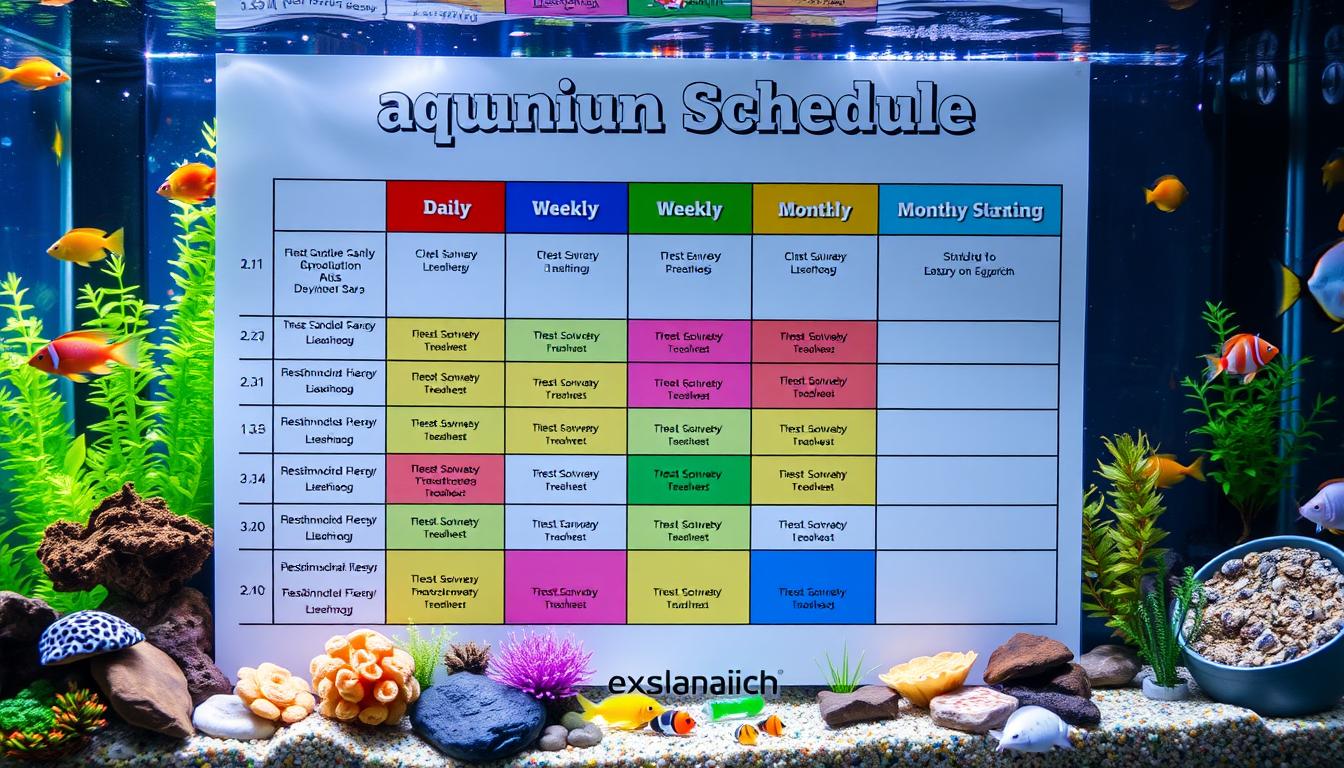


 No products in the cart.
No products in the cart.